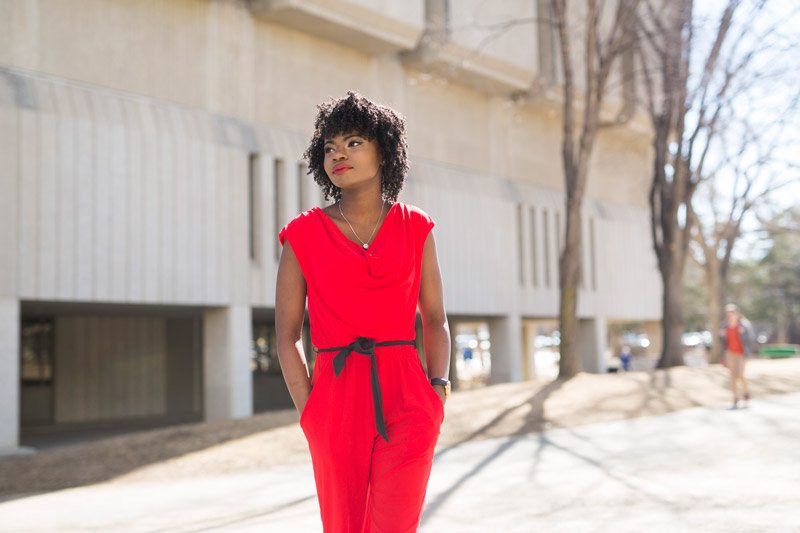In 2016, Aisha Oredegbe visited the country of her birth for the first time since childhood and found it very different from the Nigeria she left behind. Like many who are pulled between two cultures, Oredegbe struggles with questions of identity and belonging: questions that she investigates as a lifestyle blogger, poet, podcaster, online magazine editor and international volunteer. Her recent experience visiting her homeland has given her a new clarity about her place in the world. Now in her third year in the College of Arts & Science, she hopes to pursue a career in the global health sector after she completes her degree in physiology and pharmacology.
HYPHENATIONS MAKE ME uneasy.
I don’t know what it is about that tiny dash that leaves me picturing a tug-of-war between the words surrounding hyphenations. Much like my creative imagination, though, my life is a boxing match between two cultural identities. Are you Nigerian-Canadian? Are you Canadian? Perhaps you are simply Nigerian. Which one? Pick one.
We were never told much about leaving Africa. My parents, for the most part, kept my siblings and me in the dark about “the move.” All I can remember from that day were hordes of clothes and suitcases flooding the living parlour and the faces of our uncles and aunt wracked with grief. I feel awful saying this now, but their sombre expressions were not reciprocated. I remember having a beaming smile on my face, my head bobbing with excitement.
See, I’ve always been a bit of an adventure-seeker. What eight-year-old would be sad about travelling to a whole new country and starting a brand new life? So off we were to England, and subsequently to Canada a few years later. I would not return to Nigeria for another 13 years.
It started with random questions—“Where exactly are you from?”—that gradually became proclamations of hatred—“Go back to where you came from!” I was 10, struggling to fit in and, like most of my peers, highly unsure of who I was and whether I wanted to be a pilot or a princess.
I would be lying if I said I wasn’t a little affected by their cruel jabs, but I was not entirely demoralized. It was because of something my father had said upon our initial arrival in England. “I brought you here to get a good education,” he told us. “Your home is Nigeria; always remember that.”
Your home is Nigeria: a phrase I thought would stand true for the entirety of my life.
When my classmates saw how unmoved I was by their comments, the jokes died down. I didn’t care much; I was perfectly happy playing with hula hoops and skipping rope all by myself. I was a proud Nigerian and nothing was going to change that.
But then came adolescence, which no one ever warned me is likely to be the worst time of your life. It is around this time that you really start to question your identity (that word again).
For me, the whole process was like performing a juggling act with flimsy hands and bad coordination. In the left hand was my Nigerian identity, and with it my parents’ words, “Mo omo eni ti on je”—know who you are and know where you come from. In the right hand was my Canadian identity, which involved my newfound progressive ideology.
It was that freethinking Canadian identity that would mark me as “non-Nigerian” when I finally travelled back to my mother country last year.

“How can you expect your husband to do the cooking? Aisha, you are a woman. Cooking is your duty,” said an aunt in a heated argument during the trip. This was a recurring theme of almost every conversation I had with my relatives in Nigeria. Culture shock, my mother called it: the intolerant reaction your mind and body have to an unfamiliar country.
Nigeria is not some “unfamiliar” place; it is my home. Still, I felt like someone on the outside looking in. In attempting to fit the mould of Canadian society, perhaps I had lost sight of my own culture. Yet my thoughts, feelings and ideas did not feel like merely an aggregation of so-called liberal Canadian ideologies, but like my very own thoughts, feelings and ideas.
Days before my departure, I visited a Nigerian government office to obtain a passport. When I expressed my discontent about their lack of efficiency, one of the officers scowled at me and said, “This is not the way things are done here, so go back to your country!”
I had heard the phrase “go back to your country” so many times, in so many different cities: in London, England, in Medicine Hat, Canada, and now in Ibadan, Nigeria. Each time the accents were different but the message was the same. I did not belong there, and I did not belong here. My home was No Man’s Land.
The three-day journey back to Canada would lead me to a new resolution on the topic of my identity. For so long I had wanted to belong somewhere, anywhere. The truth is I am not entirely sure I belong here or there anymore. There is simply no easy way to determine just how much of my identity is accounted for by either Canadian or Nigerian culture. To ask me to choose one identity is like telling me to deny all other aspects of my being.
Rather, I now see that I am truly a mishmash of many different cultures. Call me a cultural mosaic, a hybrid or whatever.
I am the girl decked out in bright reds, blues, whites and greens during the Olympic Games, and a win for any one country (Canada, the United Kingdom or Nigeria) is truly a win for me.